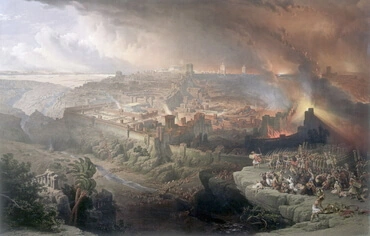1
Ascoltate questa parola, vacche di Basan, che siete nella montagna di Samaria, che oppressate i miseri, che fiaccate i poveri, che dite a’ vostri signori: Recate, acciocchè beviamo.
2
Il Signore Iddio ha giurato per la sua santità, che ecco, i giorni vi vengono addosso, ch’egli vi trarrà fuori con uncini, e il vostro rimanente con ami da pescare.
3
E voi uscirete per le rotture, ciascuna dirincontro a sè; e lascerete in abbandono i palazzi, dice il Signore.
4
Venite pure in Betel, e commettete misfatto, moltiplicate i vostri misfatti in Ghilgal, e adducete ogni mattina i vostri sacrificii, e le vostre decime a’ tre giorni.
5
E fate ardere per profumo del pane levitato, per offerta di lode; e bandite a grida le offerte volontarie; poichè così amate di fare, o figliuoli d’Israele, dice il Signore Iddio.
6
E benchè io vi abbia data nettezza di denti in tutte le vostre città, e mancamento di pane in tutti i luoghi vostri; non però vi siete convertiti a me, dice il Signore.
7
E benchè io vi abbia divietata la pioggia, tre mesi intieri avanti la mietitura, ed abbia fatto piovere sopra una città, e non sopra l’altra; e un campo sia stato adacquato di pioggia, ed un altro, sopra il quale non è piovuto, sia seccato;
8
e due, e tre città si sieno mosse verso una città, per bere dell’acqua, e non si sieno saziate; non però vi siete convertiti a me, dice il Signore.
9
Io vi ho percossi di arsura, e di rubigine; le ruche hanno mangiata la moltitudine de’ vostri giardini, e delle vostre vigne, e de’ vostri fichi, e de’ vostri ulivi; e pur voi non vi siete convertiti a me, dice il Signore.
10
Io ho mandata fra voi la pestilenza, nella via di Egitto; io ho uccisi con la spada i vostri giovani, oltre alla presa de’ vostri cavalli; ed ho fatto salire il puzzo de’ vostri eserciti, fino alle vostre nari; e pur voi non vi siete convertiti a me, dice il Signore.
11
Io vi ho sovvertiti, come Iddio sovvertì Sodoma e Gomorra; e siete stati come un tizzone salvato da un incendio; e pur voi non vi siete convertiti a me, dice il Signore.
12
Perciò, io ti farò così, o Israele; e perciocchè io ti farò questo, preparati allo scontro dell’Iddio tuo, o Israele.
13
Perciocchè, ecco colui che ha formati i monti, e che crea il vento, e che dichiara all’uomo qual sia il suo pensiero; che fa dell’alba oscurità, e che cammina sopra gli alti luoghi della terra; il cui Nome è: Il Signore Iddio degli eserciti.







